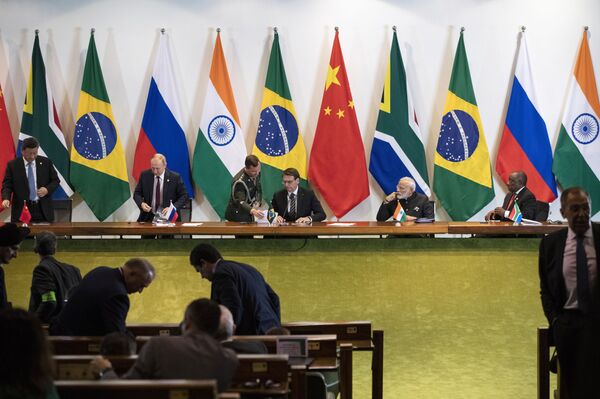Russia is looking to protect its own interests and those of its trade partners from unilateral American sanctions by continuing to reduce its dependence on trade instruments associated with the United States, Russian Foreign Minister Sergei Lavrov has said.
“Against the background of the increasingly aggressive use of financial sanctions by the US administration, Russia continues its policy aimed at gradual de-dollarisation of the economy,” the Russian foreign minister said, speaking to the Times of India in an interview published Wednesday.
“Together with our main partners, including India, we work on developing economic and legal mechanisms to reduce the negative impact of restrictions on bilateral trade and investment ties,” he added.
Russia’s top diplomat noted that increasing trade in national currencies was one of Russia’s priorities in this regard, with Moscow signing fresh agreements on currency-currency trade with China and Turkey last year, and reaching agreement within the BRICS group of nations on the opening of accounts for such transactions.
“We consider that de-pegging from the dollar in mutual settlements is an objective response to the unpredictability of US economic policy and the outright abuse by Washington of the dollar’s status as a world reserve currency,” Lavrov observed.
The Russian foreign minister arrived in India on Tuesday for a two-day visit, meeting with Indian officials and taking part in the Raisina Dialogue 2020 summit. In his interview with ToI, Lavrov emphasised that relations with New Delhi were among Russia’s “absolute foreign policy priorities”, and recalled that the two countries were working “vigorously” to prepare a new intergovernmental agreement on investment protections, and an agreement on a free trade zone between India and the Eurasian Economic Union.

Russia’s De-Dollarisation Effort
Once one of the largest investors in US debt, Moscow has dropped the vast majority of its Treasuries holdings in recent years while urging other countries to reconsider the global role of the US currency amid Washington’s sanctions-happy approach to global politics. At the same time, the Russian Central Bank has recently halved the dollar’s share in its $500 billion international reserves cushion, replacing the currency with gold, yuan, euros, and other currencies.
The United States has substantially increased the use of sanctions in its foreign policy in recent months, including, most recently, by placing restrictions on companies working on the joint Russian-Western European Nord Stream 2 gas pipeline project. In addition, Washington has sanctioned or threatened to sanction multiple countries buying weapons from Russia, targeting China and Turkey and threatening India and Egypt. Several major buyers have already come up with workarounds. This includes the 2018 $5.4 billion contract for the procurement of S-400 air defence systems, which was settled in rubles. In July 2019, it was reported that Moscow and New Delhi had devised a new ruble-rupee payment mechanism for future transactions to allow them to skirt the 2017 Countering America’s Adversaries Through Sanctions Act.



